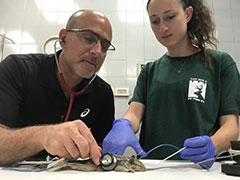July 3, 2018
Veterinary researcher examines invasive squirrel species at Jerusalem zoo
Submitted by Gabriella Doebele

An internationally found, five-striped palm squirrel has a Kansas State University veterinary researcher learning how to keep the rodent from driving people nuts.
David Eshar, assistant professor in companion exotic pets, wildlife and zoo animal medicine, is currently collaborating with the Tisch Family Zoological Gardens in Jerusalem, Israel, examining the northern palm squirrel, or Funambulus pennantii.
The five-striped palm squirrel is native to India, but can become a feral invasive species through illegal pet trade. In this research project, Eshar is testing an injectable anesthesia protocol for these squirrels supported by a department of clinical sciences research grant.
"This is part of the historical collaboration I have with the Jerusalem zoo," Eshar said. "This is a great opportunity for Israeli zoo vets and students to take part in zoo related research. I enjoy mentoring promising individuals."
"Research proposals submitted to the department of clinical sciences are intended to help facilitate clinical sciences faculty complete small-scale research projects," said Elizabeth Davis, professor and department head of clinical sciences. "These projects are intended to be pilot level — preliminary data — for larger projects or small projects that can help faculty obtain data that can contribute to their publication success.
"The current work being completed by Dr. Eshar and colleagues provides an example of a valuable study for a unique population of animals that would otherwise be challenging to successfully fund. He is likely to obtain data that can improve understanding about the physiology of this population that will be disseminated to other exotics clinicians that work in this field through publication in the peer reviewed veterinary literature."
The Jerusalem zoo is opening a new exhibit soon for the squirrel species. Eshar said this is an invasive species under strict control by the Israeli national wildlife authorities. The research will allow zoo officials to educate the public on the dangers of invasive species.
"This squirrel species is a huge problem in Australia," Eshar explained. "For me as a zoo medicine specialist, this is a great opportunity to perform research and generate novel clinical knowledge in an uncommon species."
Eshar will return to K-State to resume his regular teaching duties in the fall.
